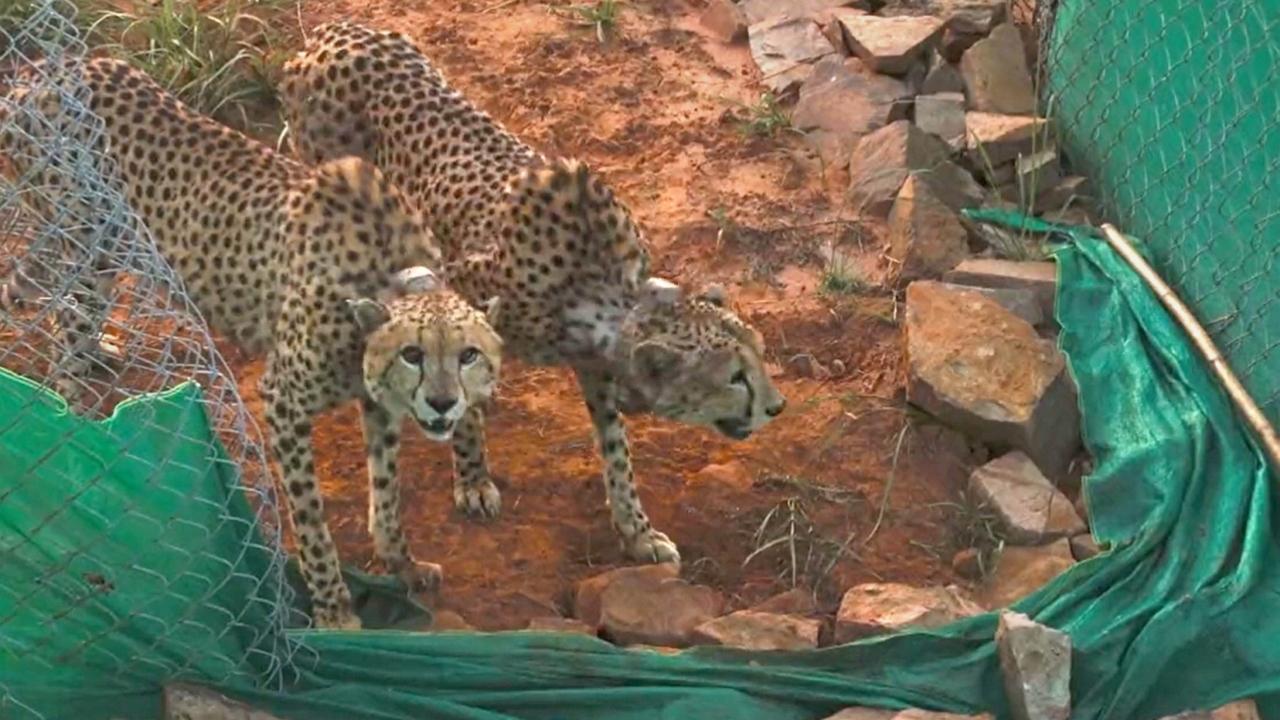A dozen cheetahs from South Africa are likely to be finally flown into India and housed in the Kuno National Park in Madhya Pradesh, where eight such felines from Namibia were brought last year, an expert said

Cheetahs being released to a bigger enclosure at Kuno National Park last year. File Pic/ PTI
After months of delay, a dozen cheetahs from South Africa are likely to be finally flown into India next month and housed in the Kuno National Park (KNP) in Madhya Pradesh, where eight such felines from Namibia were brought last year under a project, an expert said.
A Memorandum of Understanding (MoU) was signed between New Delhi and Pretoria (South Africa's administrative capital) last week, the expert associated with India's cheetah revival project told PTI over phone on the condition of anonymity.
"I think the cheetahs from South Africa will land in India around mid-February," he said.
South Africa has donated these big cats to India. But India has to pay USD 3,000 for the capture of every cheetah to the African nation before they are translocated, he said.
Talking to PTI, KNP director Uttam Sharma said, "We are waiting for the arrival of 12 South African cheetahs. We have set up 10 quarantine bomas (enclosures) for them. In two of these facilities, two pairs of cheetah brothers would be kept."
"We have come to know that Pretoria has issued an order for the translocation of cheetahs after signing the MoU," another official of the MP forest department said.
Due to the delay in the signing of the MoU for the inter-continental translocation of these big cats, some experts had last month expressed concern over the health of the South African cheetahs as these animals have been quarantined there since July 15.
As a result of long quarantine, these animals might have lost their fitness, they had said.
Prolonged quarantine could be taking a toll on the health of these big cats, who are slated to join the eight cheetahs imported from Namibia and released into the KNP in Sheopur district mid-September, the experts had said.
In fact, the 12 South African cheetahs - seven males and five females - have not hunted for themselves even once after being kept in bomas, wildlife experts in the know of India's cheetah reintroduction plan, had said.
Three of them have been kept in Phinda quarantine boma in KwaZulu-Natal Province and nine in Rooiberg Quarantine boma in Limpopo Province since July 15, they said.
They have lost fitness to a considerable extent as they have not hunted even once since July 15, one of the experts told PTI last month.
They might have put on weight like humans sitting idle, he said.
Last month, South African Minister of Environment, Forestry and Fisheries Barbara Creecy cleared the Indian proposal on translocation of cheetahs so that the South African president signs the final agreement, he added.
Experts said that a delegation from South Africa visited the KNP in early September to see arrangements at the wildlife sanctuary for housing the world's fastest land mammals.
Prime Minister Narendra Modi, on his 72nd birthday on September 17, had released eight cheetahs flown in from Namibia into the KNP amid a lot of fanfare, setting the ball rolling for the revival of their population in India where these distinctively spotted cat species became extinct seven decades ago.
Also Read: Pariksha Pe Charcha: Students are taking my test and I enjoy it, says PM Modi
These fastest land animals from Namibia - five females and three males - are currently in hunting enclosures at the park before their full release into the wild.
Five months back, India wanted to import eight cheetahs from Namibia and 12 from South Africa for their release into the KNP to add glitter to 75th Independence Day celebrations. But the plan did not materialise, the wildlife experts said.
In August, the 12 cheetahs selected by Indian officials for translocation had completed one-month in quarantine, but they couldn't be airlifted to KNP in absence of approval from the South African government. Around Independence Day, the eight Namibian cheetahs had not completed their quarantine period, so the Indian government could not bring them to KNP as well, the experts said.
As per Indian wildlife laws, a month-long quarantine is mandatory before importing animals and they are required to be kept in isolation for another 30 days after arrival in the country.
The experts said that the spotted animals' metapopulation (cheetah count in small and medium parks) in South Africa has risen to 504 from 217 in 2011.
The last cheetah died in India in Koriya district of present-day Chhattisgarh in 1947 and the big cat species was declared extinct in 1952.
Former Union Environment Minister Jairam Ramesh had initiated 'Project Cheetah' in 2009 under the United Progressive Alliance (UPA) government with an aim to reintroduce the wild cats in India.
This story has been sourced from a third party syndicated feed, agencies. Mid-day accepts no responsibility or liability for its dependability, trustworthiness, reliability and data of the text. Mid-day management/mid-day.com reserves the sole right to alter, delete or remove (without notice) the content in its absolute discretion for any reason whatsoever
 Subscribe today by clicking the link and stay updated with the latest news!" Click here!
Subscribe today by clicking the link and stay updated with the latest news!" Click here!








